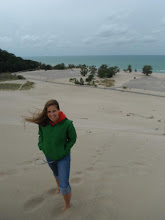
This is the most joyful group of women I have probably ever met. They are by no means wealthy. Some are single, some are widowed. Some are raising their grandchildren because their own children have died. They do not have much, but the fact that they have each other seems to suit them just fine. Despite their struggles, they welcomed us with such joy and excitement. We sang and we danced. We spent some time looking in the school, a one room concrete building where the children all crowd in together to sit on the floor and learn. These women promised to take minibusses down to the airport to see us off. We know they made good on this!

one of the school teachers walking around Chinupule

The rest of the day was spent at the Blantyre Synod Health and Development Commission. This is when we met Wellings Mwalabu, the director of programs at BSHDC, pictured above on the left. He is a well educated man working with the Livelihoods Program, focused on environmental and agricultural issues like climate change and conservation. Our first meeting was a bit awkward for me-- he asked one of the women on our team if I was a girl (meaning a child-- I look young everywhere in the world!). He was not expecting a graduate student who would ask him tons of questions about climate change, tree species, agricultural methods and conservation efforts in the following days. Thankfully we got to spend a lot of time with him in the coming days, because I really did have a lot of questions. Also, our first meeting with him was somewhat overshadowed by a doctor involved with the health aspect of the BSHDC. It was a very useful discussion, but we definitely spent more time focused on health issues in Malawi than Livelihood issues as the meeting was originally intended.

The BSHDC only recently gained "health" into its name. Really though, health and development are closely tied together. We discussed some of these issues with Dr. Roland, who is from Holland. Malawi has no cardiologists, no oncologists, and no ventilators. The country received its first CT scan machine in 2008. There are only 4 or 5 Malawian OB/GYNs, maybe a few more including expats but still less than a dozen for the 14.5 million people in the country. The top killer is malaria, but number two is rather predictable: HIV/AIDS (number 3 is tuberculosis and other respiratory problems). I was surprised to learn that most of those with the disease have completed a secondary education and are married. I would assume the opposite, but the tendency for the educated to move away from their families in order to work and support them, and the instability of such a lifestyle, are apparently where the problem lies. The government and various NGO's have brought the rate of HIV/AIDS down to 12% nationally, most notably through the testing of pregnant women for the virus and providing appropriate medications to prevent transmitting it to the baby. There is also a huge emphasis on public health, which is where this all ties into development. Clean water. Sanitation. Basic hygiene. Family planning.
This is what I wrote at the end of that day: "The meeting ran later than expected? Planned? Hard to say since schedules seem loose here, which is fine." This would become the ongoing theme, but I didn't mind for the most part since I was a very happy sponge, soaking up all sorts of information and stories and songs.


No comments:
Post a Comment